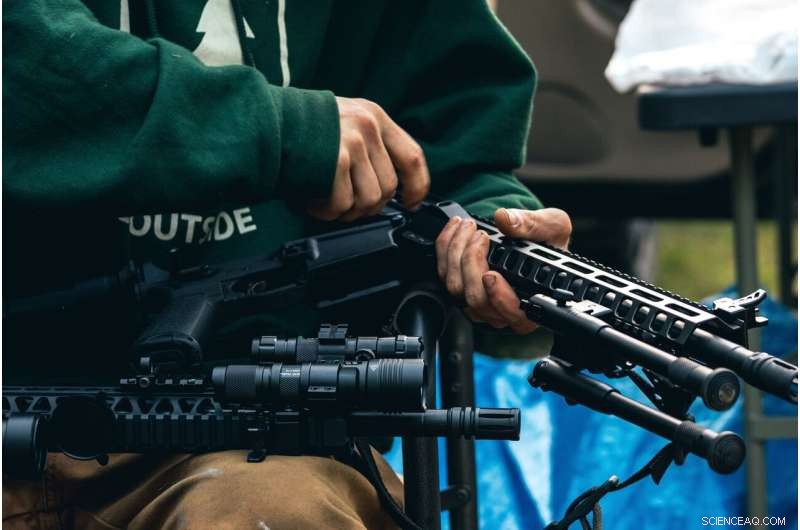
Wetenschap
Waarom wapenbeheersingswetten het congres niet halen, ondanks publieke steun van de meerderheid en herhaalde verontwaardiging over massale schietpartijen

Tegoed:Unsplash/CC0 Publiek domein
Met het bloedbad in Uvalde, Texas en Buffalo, New York in mei 2022, zijn de oproepen aan het Congres opnieuw begonnen om wapenbeheersing uit te vaardigen. Sinds het bloedbad in 2012 van 20 kinderen en vier personeelsleden op de Sandy Hook Elementary School in Newtown, Connecticut, heeft de wetgeving die is ingevoerd als reactie op massamoorden consequent de Senaat niet gehaald. We vroegen politicologen Monika McDermott en David Jones om lezers te helpen begrijpen waarom verdere beperkingen nooit worden doorgevoerd, ondanks het feit dat een meerderheid van de Amerikanen voorstander is van strengere wapenwetten.
Massamoorden komen steeds vaker voor. Toch is er geen significante wapenwetgeving aangenomen als reactie op deze en andere massale schietpartijen. Waarom?
Monika McDermott:Hoewel er consequent een meerderheid is voor het iets meer beperken van de toegang tot wapens dan de regering momenteel doet, is dat meestal een kleine meerderheid, hoewel die steun de neiging heeft om op korte termijn te stijgen na gebeurtenissen zoals de recente massale schietpartijen.
We hebben de neiging om te ontdekken dat zelfs wapenbezitters beperkingen ondersteunen, zoals achtergrondcontroles voor alle wapenverkopen, ook bij wapenshows. Dus dat is er een waar iedereen achter staat. Het andere probleem waar huishoudens met wapenbezitters achter staan, is dat ze het niet erg vinden dat wetshandhavers wapens wegnemen van mensen die wettelijk als onstabiel of gevaarlijk zijn beoordeeld. Dat zijn twee beperkingen waarop je vrijwel unanieme steun van het Amerikaanse publiek kunt krijgen. Maar overeenstemming over specifieke elementen is niet alles.
Dit is niet iets waar mensen om schreeuwen, en er zijn zoveel andere dingen in de mix waar mensen zich nu veel meer zorgen over maken, zoals de economie. Ook zijn mensen onzeker over het federale begrotingstekort, en de gezondheidszorg is nog steeds een eeuwigdurend probleem in dit land. Dus dat soort dingen staan bovenaan de wapenwetgeving in termen van prioriteiten voor het publiek.
Je kunt dus niet alleen denken aan meerderheidssteun voor wetgeving; je moet nadenken over prioriteiten. Mensen op kantoor zorgen wat de prioriteiten zijn. Als iemand ze niet wegstemt vanwege een probleem, dan doen ze het niet.
Het andere probleem is dat je net een andere kijk hebt op de wapensituatie in huishoudens met wapens en huishoudens zonder wapens. Bijna de helft van het publiek woont in een huishouden met een pistool. En die mensen zijn over het algemeen veel minder bezorgd dan degenen in niet-gewapende huishoudens dat er in hun gemeenschap een massale schietpartij zou kunnen plaatsvinden. Het is ook onwaarschijnlijk dat ze zeggen dat strengere wapenwetten het gevaar van massale schietpartijen zouden verminderen.
De mensen die geen wapens hebben, denken het tegenovergestelde. Ze denken dat wapens gevaarlijk zijn. Ze denken dat als we de toegang zouden beperken, massale schietpartijen zouden afnemen. So you've got this bifurcation in the American public. And that also contributes to why Congress can't or hasn't done anything about gun control.
How does public opinion relate to what Congress does or doesn't do?
David Jones:People would, ideally, like to think that members of Congress are responding to public opinion. I think that is their main consideration when they're making decisions about how to prioritize issues and how to vote on issues.
But we also have to consider:What is the meaning of a member's "constituency"? We can talk about their geographic constituency—everyone living in their district, if they're a House member, or in their state, if they're a senator. But we could also talk about their electoral constituency, and that is all of the people who contributed the votes that put them into office.
And so if a congressmember's motive is reelection, they want to hold on to the votes of that electoral constituency. It may be more important to them than representing everyone in their district equally.
In 2020, the most recent congressional election, among citizens who voted for a Republican House member, only 24% of those voters wanted to make it more difficult to buy a gun.
So if you're looking at the opinions of your voters versus those of your entire geographic constituency, it's your voters that matter most to you. And a party primary constituency may be even narrower and even less in favor of gun control. A member may have to run in a party primary first before they even get to the general election. Now what would be the most generous support for gun control right now in the U.S.? A bit above 60% of Americans. But not every member of Congress has that high a proportion of support for gun control in their district. Local lawmakers are not necessarily focused on national polling numbers.
You could probably get a majority now in the Senate of 50 Democrats plus, say, Susan Collins and some other Republican or two to support some form of gun control. But it wouldn't pass the Senate. Why isn't a majority enough to pass? The Senate filibuster—a tradition allowing a small group of Senators to hold up a final vote on a bill unless a three-fifths majority of Senators vote to stop them.
Monika McDermott:This is a very hot political topic these days. But people have to remember, that's the way our system was designed.
David Jones:Protecting rights against the overbearing will of the majority is built into our constitutional system.
Do legislators also worry that sticking their neck out to vote for gun legislation might be for nothing if the Supreme Court is likely to strike down the law?
David Jones:The last time gun control passed in Congress was the 1994 assault weapons ban. Many of the legislators who voted for that bill ended up losing their seats in the election that year. Some Republicans who voted for it are on record saying that they were receiving threats of violence. So it's not trivial, when considering legislation, to be weighing, "Yeah, we can pass this, but was it worth it to me if it gets overturned by the Supreme Court?"
Going back to the 1994 assault weapons ban:How did that manage to pass and how did it avoid a filibuster?
David Jones:It got rolled into a larger omnibus bill that was an anti-crime bill. And that managed to garner the support of some Republicans. There are creative ways of rolling together things that one party likes with things that the other party likes. Is that still possible? I'm not sure.
It sounds like what you are saying is that lawmakers are not necessarily driven by higher principle or a sense of humanitarianism, but rather cold, hard numbers and the idea of maintaining or getting power.
Monika McDermott:There are obvious trade-offs there. You can have high principles, but if your high principles serve only to make you a one-term officeholder, what good are you doing for the people who believe in those principles? At some point, you have to have a reality check that says if I can't get reelected, then I can't do anything to promote the things I really care about. You have to find a balance.
Wouldn't that matter more to someone in the House, with a two-year horizon, than to someone in the Senate, with a six-year term?
David Jones:Absolutely. If you're five years out from an election and people are mad at you now, some other issue will come up and you might be able to calm the tempers. But if you're two years out, that reelection is definitely more of a pressing concern.
Some people are blaming the National Rifle Association for these killings. What do you see as the organization's role in blocking gun restrictions by Congress?
Monika McDermott:From the public's side, one of the important things the NRA does is speak directly to voters. The NRA publishes for their members ratings of congressional officeholders based on how much they do or do not support policies the NRA favors. These kinds of things can be used by voters as easy information shortcuts that help them navigate where a candidate stands on the issue when it's time to vote. This gives them some credibility when they talk to lawmakers.
David Jones:The NRA as a lobby is an explanation that's out there. But I'd caution that it's a little too simplistic to say interest groups control everything in our society. I think it's an intermingling of the factors that we've been talking about, plus interest groups.
So why does the NRA have power? I would argue:Much of their power is going to the member of Congress and showing them a chart and saying, "Look at the voters in your district. Most of them own guns. Most of them don't want you to do this." It's not that their donations or their threatening looks or phone calls are doing it, it's the fact that they have the membership and they can do this research and show the legislator what electoral danger they'll be in if they cast this vote, because of the opinions of that legislator's core constituents.
Interest groups can help to pump up enthusiasm and make their issue the most important one among members of their group. They're not necessarily changing overall public support for an issue, but they're making their most persuasive case to a legislator, given the opinions of crucial voters that live in a district, and that can sometimes tip an already delicate balance.
 Wetenschappers ontwikkelen een materiaal voor gebruik in stralingstolerante apparaten
Wetenschappers ontwikkelen een materiaal voor gebruik in stralingstolerante apparaten Doorbraak in macromoleculaire machines voor actief gecontroleerde toediening van kankergeneesmiddelen
Doorbraak in macromoleculaire machines voor actief gecontroleerde toediening van kankergeneesmiddelen De structuur van ATP-synthase oplossen
De structuur van ATP-synthase oplossen Wat bepaalt de viscositeit van een vloeistof?
Wat bepaalt de viscositeit van een vloeistof?  Een kleur van poreuze materialen in- en uitschakelen met zuur
Een kleur van poreuze materialen in- en uitschakelen met zuur
 Geloven de meeste Amerikanen in door de mens veroorzaakte klimaatverandering?
Geloven de meeste Amerikanen in door de mens veroorzaakte klimaatverandering? Hoe zal La Niña de winter in de VS beïnvloeden?
Hoe zal La Niña de winter in de VS beïnvloeden? Tientallen miljoenen vechten tegen overstromingen in Pakistan terwijl het dodental stijgt
Tientallen miljoenen vechten tegen overstromingen in Pakistan terwijl het dodental stijgt Onverwacht verband tussen luchtverontreinigende stoffen van planten en door de mens veroorzaakte emissies
Onverwacht verband tussen luchtverontreinigende stoffen van planten en door de mens veroorzaakte emissies Levenscyclus van pinguïns
Levenscyclus van pinguïns
Hoofdlijnen
- Waarom is fotosynthese belangrijk voor mensen?
- Betere mensen maken - Het huwelijk tussen mens en machine
- Maak kennis met de vrouwen die jagen op gigantische pythons die alles opeten in de Everglades
- Zuid-Amerikaanse brulapen zijn mogelijk meer bedreigd dan eerder werd gedacht
- Nieuwe statistische methode voor het evalueren van reproduceerbaarheid in studies van genoomorganisatie
- Wat zijn 3 functies van de navelstreng?
- Hoe klimaatverandering subalpiene wilde bloemengemeenschappen kan hervormen
- Controversiële onkruidverdelger houdt EU in de knoop (Update)
- Hoe passen planten zich aan aan aquatische omgevingen?
- Onderzoekers identificeren twee nieuwe oude zoogdieren in Bolivia

- Onsmeltbare chocolade en bean-to-bar:een cacao-expert belicht drie zoete trends

- Hoe bedrijven hun leveranciers kunnen wapenen om de CO2-uitstoot te verminderen

- Rijke landen schieten tekort in wetenschap gendergelijkheid:UNESCO

- Steden beloopbaarder maken door te begrijpen hoe andere mensen onze reizen beïnvloeden

 Hoe kristallen te vinden
Hoe kristallen te vinden Wetenschappers ontdekken een genetisch mechanisme dat het opbrengstpotentieel van graangewassen zou kunnen verbeteren
Wetenschappers ontdekken een genetisch mechanisme dat het opbrengstpotentieel van graangewassen zou kunnen verbeteren Machine learning om veiligere batterijen te ontwikkelen
Machine learning om veiligere batterijen te ontwikkelen Rapport toont aan dat klimaatverandering het Amerikaanse financiële systeem in gevaar brengt
Rapport toont aan dat klimaatverandering het Amerikaanse financiële systeem in gevaar brengt Beheersing van methaan is een snelle en cruciale manier om de opwarming van de aarde te vertragen, zeggen Princeton-experts
Beheersing van methaan is een snelle en cruciale manier om de opwarming van de aarde te vertragen, zeggen Princeton-experts Prevalentiepercentages per duizend berekenen
Prevalentiepercentages per duizend berekenen  Behandelde superlegeringen vertonen ongekende hittebestendigheid
Behandelde superlegeringen vertonen ongekende hittebestendigheid Halfgeleider werkt beter wanneer deze is gekoppeld aan grafeen
Halfgeleider werkt beter wanneer deze is gekoppeld aan grafeen
- Elektronica
- Biologie
- Zonsverduistering
- Wiskunde
- French | Italian | Spanish | Portuguese | Swedish | German | Dutch | Danish | Norway |

-
Wetenschap © https://nl.scienceaq.com

